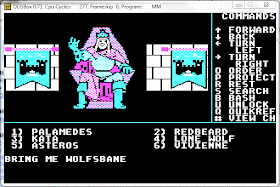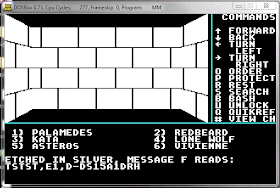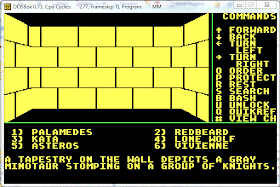 |
| The adventurers get a quest that truly tests their ingenuity. |
I've been waiting for Might and Magic to settle in to a more cohesive narrative before I posted again, but that just isn't happening. The game is, rather, coming together like a puzzle, and until I get more pieces I won't be able to see the full picture.
After I found the Merchant's Pass, I was able to visit a couple of the castles and get quests. It appears that each lord gives a series of quests, starting with very easy ones ("bring me garlic!" or visit a particular location) and escalating to hard ones. My current quest is to find a medusa's head. I have a pretty good idea where to look, but gorgons and basilisks keep turning me to stone, and I won't have "stone to flesh" for another level yet. Fortunately, whenever I encounter obstacles like this, there's another map to explore.
In
my first Might & Magic posting, I thought there might be around 35 maps to explore. Ha! I didn't account for all the dungeons, caves, castles, and fortresses—some with multiple levels. I'm up to 53 now, and I think it might be finally slowing down. Still making very little progress on the "main quest," but I'll let you know when that changes.
The game got a little easier when I reached Level 4 and got two spells: "time warp," which allows you to escape combat, and "surface," which allows you to quickly exit a dungeon. These coupled with "fly" mean that I'm never more than a few moves from a town, healing, and a save point. But you can't always rely on them. "Time warp" has a way of failing right when you need it most, and I still get wiped out in about 25% of my forays from town.
A few other random things from the game.
1. Black & white checkerboard rooms. I keep finding rooms like this one in dungeons:

A statue in Sorpigal suggests these have something to do with the seer Og (who I found on one of the maps but couldn't do anything with), but I have no idea what I'm supposed to do with them. (S)earching returns nothing and there are no secret doors.
2. Magic square puzzle. One of the dungeons had this neat soduku-ish game where the entire dungeon was laid out in a 4 x 4 grid. The center of each room had a dial that you could set to a number from 1-9. Some of them were already pre-set to numbers higher than 9. I figured out right away that it was a magic square in which all of the rows and columns needed to add up to the same number (34) and you could only use each number once. With a little help from Excel, I figured it out and was duly rewarded. I can't remember this type of puzzle in a CRPG earlier than this one.


3. Messages. One of the consistent features of Might & Magic is that you encounter a series of nonsense messages at various places in the game (in VI and VII they're on obelisks scattered throughout the land; in I they're written on walls). Once you've found all the messages, you interleave the letters or words to determine the total narrative. I've only found a few, so I can't even begin to guess. There seem to be two sets—one with letters and one with entire words.

4. Corak. In one dungeon, I found this message scrawled on a wall. It is the first reference to the enigmatic Corak, who appears in a bunch of the Might & Magic games, but frankly I forget what his specific role is. I just remember him—or references to him—in III. Maybe this game will remind me.

5. A dungeon with invisible walls. I stumbled into this one from a magic door. The "locate" spell didn't work and you couldn't see most of the walls—you could only try to walk into them and get a "blocked!" message. This was a pain to map. I'm still not sure what I'm supposed to do there; I apparently need some kind of card.

6. The experience fountain. In a ruined castle called Dragadune, I found this fountain, which takes your gold and gives you an equivalent number of experience points. I thought this was unique to Might & Magic VI. Now I'm wondering if all Might & Magic games have one and I've just forgotten—or missed them.

6. Little touches. Wandering through the fortress of the minotaur lord, you come across things like this. Yes, it would be nice if the game actually showed you these tapestries, but we're a few years away from those graphical capabilities. It's still a neat touch that keeps the game interesting.

My basic strategy has been to explore each map until I get blocked—either because I need an item I don't have or because the monsters get too hard—and then move on to the next map, revisiting the previous ones at higher levels. As much as I enjoy the game, I'm getting ready for it to end—my long list awaits—but I actually want to find out what the main quest is, who Corak is, and the fate of the alien invader. To me, that's a sign of a good CRPG.
















Good thing you didn't wait - the narrative never really settles into something cohesive, probably not until MM3. I did warn you about the maps!
ReplyDelete0. Alignment has to do with the prisoners you find in the 6 castles (one each). You must treat the prisoners in a way that matches the alignment of the character you choose. Then you visit a giant somewhere on the surface and get an XP reward.
1. You are correct, these have to do with Og. They have either items or information you need. If you didn't see a message there I'm not really sure what you need to do to activate it...
2. I love the Magic Square. It's fun and quite unexpected in this type of game.
3. The messages by themselves aren't much help until you find the interleaves (yes, there are 2). Decoding them will give you some good hints about what you're supposed to do to win the game.
4. Corak is all over the place in MM 1-5. He's only barely referenced in 1, makes a short appearance in 2, but his role in the series will only start to make sense in 3 (that's really the game where the story started to become cohesive).
5. You can forget about this one for a while - you'll know when you need to come back. This is one dungeon where Etherealize (a spell you don't have yet) makes things MUCH easier - as long as you know/see where you're going you don't need to map at all. I think one of the disadvantages of your method of exploration (going through somewhere until you get stuck, as opposed to being sent there on a quest) is that you'll have to revisit many of these locations. But whatever's more fun for you!
6. I think all MM games have this, certainly 2 and 3 and 6.
Be advised: not all your questions will be answered in this game, though you will get at least a partial answer to the others
Thanks, Ziad! Everything you said turned out to be true, and yet I didn't get around to reading the comment until after I had won. Your last paragraph is particularly vexing. Some games beat you over the head with their mythology; others leave you to piece it together from vague clues. This is definitely one of the latter.
ReplyDeleteThis was the game that started it all for me. Thank you for taking the time to relive and document it for me. It was so much fun to read.
ReplyDeleteI'm seeing all these comments about how great the game is, and I'm reading through your review which sounds like it will be incredibly positive, but to me this game just looks incredibly frustrating so far. I'm not seeing the allure at all. I mean, invisible walls?
ReplyDeleteThere are a lot of points where you can get stuck - I doubt I'd have figured out the Sudoku thing, and it seems like you spent at least a third of your time replaying stuff you just did before because you died and had to reload.
It looks like Wizardry, except there is no permadeath, a bunch of puzzles, less direction, and a flawed difficulty system which wipes out your party way too often.
Games like this, at least if it is the way you described it, are why I like permadeath. I never have to replay the same thing over and over again, and because of the nature of permadeath, developers are more careful about the types of monsters you can encounter. I've littered dungeon floors with several thousand characters in ADOM, and I'm accepting of that. Because almost none of those deaths felt 'unfair'. It seems like there are a lot of bullshit deaths in games like this and it's just bad design IMO.
That said, I'm sure there's some redeeming characteristic that I'm missing. I'll see what the next posts have to say.
DeleteYeah, bad design for sure. Unbalanced, unfair and grindy. I guess it's appealing if you grew up with unbalanced, unfair, grindy RPGs and feel anything else is hand-holding.
DeleteIt may be that you have to play it to truly understand it, or that you have to, as Tristan says, have come from the era.
DeleteWhen I was writing in these early days, I wasn't putting everything in its proper historical context, so I didn't emphasize enough how mapping is a part of the process. You have to essentially step on every square of the game to ensure that you face every encounter, and thus mapping a dozen squares and annotating a couple of encounters is a type of "progress" even if you lose your character levels.
Losing a party still sucks, but the game still finds a decent balance. Even with all the deaths, leveling is rapid enough that you feel a strong sense of character progression.
If you don't like to replay areas, I can't imagine how you like the permadeath of Wizardry. I can see why the permadeath of a roguelike wouldn't bother you, since every dungeon is generated anew. For me, I'd rather have M&M's compromise: no permadeath, but only allow saving in limited places. The worst that you lose is the current expedition.
I am from the era. I played a fair amount of these games when they were new. But this particular game doesn't sound like my cup of tea.
DeleteWizardry is different (and I'm talking about the first one here). It doesn't have many cheap deaths. When I get killed in Wizardry, I'm usually aware beforehand that I'm pushing it a bit, like exploring deeper than I ever did before - getting those few extra squares that you're talking about. When I open a chest or I go to an unmarked square, I know there's a chance that I'm going to hit something that I won't like. If someone winds up dead in those situations, fair play.
The Wizardry system is also not replaying... time continues to move forward. The sun comes up the next day, your 'A' party has been wiped out, and now you have to go and get them (which is a quest in itself), so it's a different situation.
You've said yourself that you feel the constant tension as you move through the dungeon in Wizardry. That tension is what immersion is all about. Did you feel that level of tension in this game?
Though of course everyone has their own play style. You look like you enjoy some good puzzles in your games, whereas I'm more of a wargamer hybrid. To give you an idea, I really liked the original XCOM, where you could get attached to characters, but they could also get killed.
Just saying that I started playing it with a helper (the wonderful app "Where are we" and there was a point where I stood up scared because this game sucked up 14 hours of the day straight.
ReplyDeleteSorry for my last comment — please delete it right away. I must have been half-asleep and wrote it in the wrong language. Unfortunately, it looks like you can’t edit your comments immediately here.
ReplyDeleteMy question was: did you end up spending all your money for experience or not?